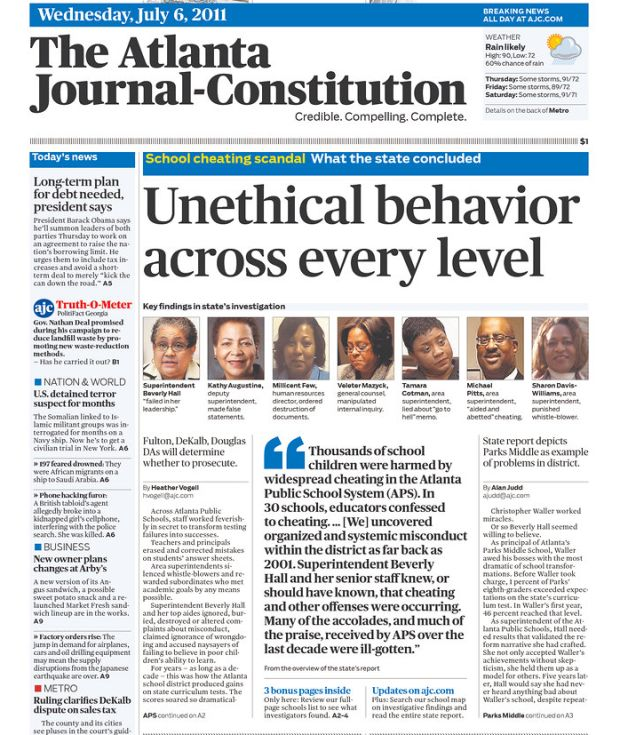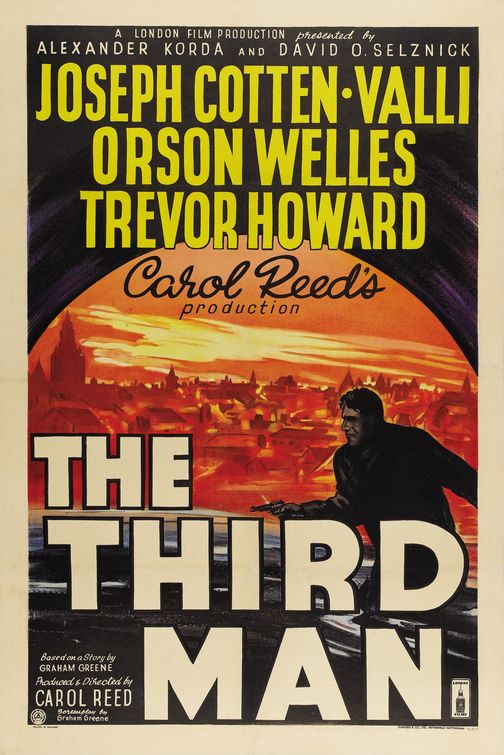By Ronald J. Granieri, on Mon Jan 9, 2012 at 1:00 PM ET  Ron Granieri’s First Response Ron Granieri’s First Response
[John Y.’s Provocation; The RP’s Rebuttal #1; Ron Granieri’s Rebuttal #2; Rod Jetton’s Rebuttal #3; Krystal Ball’s Rebuttal #4; John Y.’s First Defense; Rod Jetton’s Response #1; Jeff Smith’s Rebuttal #5; John Y.’s Second Defense]
John Y. is right to bring up the power of TV, but I have to play the contrarian idealist for just one more moment.
Everyone loves to make the argument that surface appearance is what matters most in politics, especially when their candidate loses. It is yet another way to assume that the people who vote differently than you are too shallow and superficial to understand the depth and brilliance of your own positions.
It is a dangerous fallacy, though, because it can lead strategists to believe that winning elections ONLY involves the manipulation of images and to forget the significance of the actual political ideas and positions behind them.
Of course it helps to be pleasant and nice looking in most cases. But if sex appeal was all you needed for electoral success, then Sarah Palin would be President, and the RP would be governor of Kentucky. [ED’s note: Aw shucks!] Ask Rick Perry (or, if you want a coherent answer, don’t): it matters what candidates say when they open their pretty mouths.
By Ronald J. Granieri, on Mon Jan 9, 2012 at 9:30 AM ET  Rebuttal #2: Ronald J. Granieri Rebuttal #2: Ronald J. Granieri
I have a few somewhat related thoughts in response to what has been said so far.
[Read John Y.’s Provocation]
[Read the RP’s Rebuttal]
We need to fight against the persistent myth that being universally respected and loved is the essence of leadership. Obama’s real or feigned belief that he could triumph over all disagreement and be adored by being adorable was doomed from the start. Doomed for the simple reason that making policy means dealing with disagreement. We all want to believe that the positions we take on issues are so self-evidently reasonable that any honest and rational person HAS to agree with us. But that is just a convenient and comforting fiction. More than that, it is also a backhanded way to belittle and insult people who think differently than we do by dismissing them as either stupid or mean-spirited or both.
There are many possible answers to any policy question, and (at the risk of sounding more like a relativist than I am) many of them can be right at the moment. Only in retrospect can we say for certainty what worked and what did not. In the meantime, we will disagree. And that is a good thing, because disagreement is the life blood of a competitive electoral system. It is pure folly to believe that you will get your way because your opponents like you. You get your way by taking clear positions and defending them within the existing system. (Though of course the system itself needs to function properly—that’s my shout out to No Lablesl!) You need to show what you believe, and what you are willing to do in pursuit of those beliefs, not wait for other people to agree with you before you take a position. Your opponents will criticize you no matter what you do (they will call you weak when you defer, and arrogant when you push forward), so why surrender pre-emptively? It is risky to take positions, but there is no reward without risk. True leaders take risks.
This myth of being universally loved is fostered by the hagiographies that come after a famous politician dies. The best example here is President Reagan. Upon his death all we have heard is how terrific he was, and both media personalities and politicians of all stripes have downplayed the controversies of the Reagan era. Frankly, that is an insult to his memory and to anyone with actual historical sense. For all his sunny optimism, Reagan was intensely controversial, and neither his fans nor his detractors do him justice by pretending he was not. Indeed, his opponents often hated him most of all because he was so goddam genial. He pushed hard for things he wanted, made compromises when he thought it made sense to do so, but he did not shy away from decisions in hopes that his opponents would agree with him before he made a move. Anyone who lived through the 1980s knows what the political debates of those years were like.
Read the rest of…
The RPs Debate Presidential Leadership: Ron Granieri Rebuts
By RP Staff, on Tue Jan 3, 2012 at 5:00 PM ET After two years of campaign, hundreds of pundit prognostications, and thousands of cable news sound bites, at long last, what you’ve been waiting for…
Our fearless contributors — Contributing RPs, Friends of RP and RP Staff — offer their predictions for tonight’s Iowa caucuses.
And you can too — please give us your predictions in the Comments section below.
Without further ado…(Click on their name to find out their background)…
The RP: Paul 30%; Romney 25%; Santorum 21%; Gingrich 7%; Perry 6%; Bachmann 4%, Huntsman 1%. I don’t think Rick “Man On Dog” Santorum’s organization is strong enough to take advantage of his surge. I also think Paul’s support is underestimated in the polls because his grassroots support is so fervant, and the tin foil hat crowd among his followers are fearful of pollsters. Remember Pat Robertson?
Michael Steele: Click here for his exclusive-to-The-RP report from Iowa.
Jeff Smith: Santorum 27; Romney 23; Paul 23; Perry 11; Gingrich 9; Bachmann 6. I think some Bachmann/Gingrich/Perry folks walk in to their caucus, see how outnumbered they are by Sant-mentum, and get on the bandwagon.
Jason Grill: Romney, Paul, and Santorum will finish first, second, and third. The order though is more “up in the air” than George Clooney was in his recent Oscar nominated movie. Organization and friends twisting other friends arms at the caucuses will decide the order of the top three. If Romney finishes third that WILL be news and change the race somewhat moving forward. He will be seen as an even weaker front runner if this happens. Also, it will be interesting to see where Perry and Gingrich finish tonight. Keep a lookout for their percentages at the end of the night. A fourth place finish for Perry over Gingrich will signal a potential showdown with Romney in South Carolina. Lastly, I am anxious to see how Huntsman finishes in next week’s New Hampshire primary after skipping Iowa.
Mark Nickolas: Paul (25%); Romney (23%); Santorum (22%); Gingrich (11%); Perry (10%); Bachmann (6%). Iowa requires a level of commitment from supporters unlike anywhere else. Those with the best state organization and strongest levels of commitment do especially well (Paul and Paul). Also, since Independents and Dems can participate if they want to cross over — as Indies did for Obama in ’08 — that’s likely to help Paul the most. Nefarious (aka loyal) Dems are going to support anyone but Romney to ensure a protracted GOP race, with Paul and Santorum benefitting most.
Rod Jetton: I think Ron Paul will just nip Romney and Rick Santorum will get third. Newt probably finishes in 4th. The Ron Paul forces are dedicated and with his numbers going up they and their friends have started believing he can win. They will turn out and surprise all the experts.
Greg Harris: Santorum – 26%; Romney – 25%; Paul – 21%; Gingrich – 12%; Bachman – 8%; Perry – 7%; Huntsman – 1%. Santorum’s diligent grassroots work throughout the State this past year will pay off, resulting in more ardent caucus warriors advocating his case, and moving some on-the-fence Bachman and Perry supporters. Ron Paul’s fanatical base will still assure him over an over 20% showing. The minority moderate voters will hold their noses and back Romney.
Read the rest of…
Our Contributors Predict the Iowa Caucuses…
By Ronald J. Granieri, on Mon Nov 21, 2011 at 8:30 AM ET  In 1963, William F. Buckley, Jr. quipped “I would rather be governed by the first 2000 names in the Boston phone book than the faculty of Harvard University.” The quote has been passed around so often in various forms (my initial Google search this morning returned more than seventy million hits), with and without attribution to the late Mr. Buckley, that the original context of the comment (a jab at the Kennedy brain trust) is lost in the mist. In 1963, William F. Buckley, Jr. quipped “I would rather be governed by the first 2000 names in the Boston phone book than the faculty of Harvard University.” The quote has been passed around so often in various forms (my initial Google search this morning returned more than seventy million hits), with and without attribution to the late Mr. Buckley, that the original context of the comment (a jab at the Kennedy brain trust) is lost in the mist.
At the risk of alienating many of my readers, I will declare right now that Buckley has been one of my heroes since my teenage years. However my opinions on specific issues may have diverged from his over time, Buckley’s sparkling wit and clarity of thought continue to inspire me. I still read his works for pleasure, and measure my own poor writing style against his.
 Even the cleverest comments from great thinkers, however, can be dangerous when they are wrenched from their original context and take on a life of their own. (Thomas Jefferson, the tree of liberty, and the blood of tyrants come to mind…) Buckley’s Boston phone book quote is just such a comment. It has become a popular rhetorical tic among conservatives, and threatens to be more damaging to the conservative intellectual project than anything ever dreamt up on the left. Even the cleverest comments from great thinkers, however, can be dangerous when they are wrenched from their original context and take on a life of their own. (Thomas Jefferson, the tree of liberty, and the blood of tyrants come to mind…) Buckley’s Boston phone book quote is just such a comment. It has become a popular rhetorical tic among conservatives, and threatens to be more damaging to the conservative intellectual project than anything ever dreamt up on the left.
The quote, and the attitude behind it, has been in a great deal of conscious and unconscious circulation of late, as Republican presidential candidates attempt to contrast themselves with President Obama and to deal with their own occasional lapses of knowledge or eloquence. Thus we have Rick Perry, fresh off recent debate catastrophes, saying to all who would listen, “I am a doer, not a talker. ” Similarly, Herman Cain, far from embarrassed about his lack of facility in discussing complicated international events, has embraced ignorance, proclaiming (in unconscious echo of a classic moment from The Simpsons): “We need a leader, not a reader.” In this time of crisis, these messages suggest, the country should reject intellectual attainment in favor of someone unfettered by too much thinking.
Read the rest of…
Ronald J. Granieri: Up From Ignorance
By Ronald J. Granieri, on Fri Oct 21, 2011 at 8:30 AM ET  The Arab Spring has led many commentators to ruminate upon the mixed blessings of democracy. As they asked when Hamas won the first free elections in Gaza, or when Hezbollah found itself in government in Lebanon, people today are asking, “Is democracy a good thing if people end up voting for extremists, or if they vote to crush the rights of minorities?” Ross Douthat, reflecting on the increasingly dire situation of Coptic Christians in Egypt, recently posed the question slightly differently, wondering whether the development of modern polities actually requires a kind of forced homogenization that comes at the expense of minorities. The Arab Spring has led many commentators to ruminate upon the mixed blessings of democracy. As they asked when Hamas won the first free elections in Gaza, or when Hezbollah found itself in government in Lebanon, people today are asking, “Is democracy a good thing if people end up voting for extremists, or if they vote to crush the rights of minorities?” Ross Douthat, reflecting on the increasingly dire situation of Coptic Christians in Egypt, recently posed the question slightly differently, wondering whether the development of modern polities actually requires a kind of forced homogenization that comes at the expense of minorities.
Many if not all readers of this post likely agree that they prefer to live under a system of representative government based on democratic elections. Nevertheless, I wonder how many have taken seriously the structural problem of how democracy encouraging homogenization and its implications for the future. I have to admit it worries me more each day. My inspiration for such worry is not the impending presidential election (which gets more impending all the time as states fall over themselves to push their primaries back into 2011) but rather the approaching Election Day in my own back yard, Philadelphia. This year, as in 2007, the November Mayoral election is a complete afterthought, since it is obvious that Democratic incumbent Michael Nutter will sail to victory over the underfunded and barely noticed Republican challenger (and former Democrat) Karen Brown. The lack of excitement is even greater this time, since in 2007 at least the Democratic primary in May was a close-fought race among several viable candidates, whereas this year Nutter won the Democratic primary handily over token resistance. Then as now, however, commentators have to keep reminding themselves and their readers/listeners that Nutter has not officially been (re-) elected yet, even though there is no doubt.
 Mayor Michael Nutter My point here is not to attack Philadelphia (which I have come to like very much, as only the son of a different but eerily similar gritty post-industrial city) or Michael Nutter, who strikes me as an earnest and honest man. Nor is this a purely partisan complaint—I happen to agree with those Philadelphia Republicans who argue that their leadership is complicit in this situation. The problem is not that the Democrats will win in November. The problem is that, no one even pretends that the election will be competitive. I have seen this same development from the other side, when I lived in the lovely town of Greenville South Carolina, where all the action was in the Republican primary, while the general elections were a foregone conclusion. (That the one-party system was especially entrenched in Chicago, where I lived for the second through seventh years of the Reign of Richard II, goes without saying…)
Read the rest of…
Ron Granieri: Democracy is for Losers…and That is a Good Thing
By Ronald J. Granieri, on Wed Sep 28, 2011 at 8:30 AM ET  Last month I offered a meditation on sports in general and my devotion to the Buffalo Bills in particular under the motto, “Root for the Laundry.” In it, I emphasized that it is devotion to the team as symbol rather than any particular player that gives sports meaning, at least to me. Last month I offered a meditation on sports in general and my devotion to the Buffalo Bills in particular under the motto, “Root for the Laundry.” In it, I emphasized that it is devotion to the team as symbol rather than any particular player that gives sports meaning, at least to me.
Well, the last month has been interesting. The Bills did not win that first preseason game against Chicago, which had inspired my post, and looked so awful in the second preseason game the following week in Denver that many professional observers (not to mention the self-flagellants within Bills Nation who populate most Internet discussion boards devoted to the team) concluded that this team was likely to be the worst in the NFL this year, if not in history. One columnist, seconded by a chorus of disappointed Buffalonians, called the Buffalo roster “a crumbling monument to neglect and bad personnel moves,” and predicted nothing good for the immediate future. Words such as “disaster” were thrown around, and cynics even claimed to espy a dark conspiracy of conscious destruction a la Major League, preparing the way for the team to move to Los Angeles or, worse, Toronto.
 Then, something happened. The last two preseason games turned out to be encouraging, which was nice, though skepticism reigned as the Bills approached their regular season opener in Kansas City. To the delighted shock of Bills fans, and the plain old shock of most other observers, however, the Bills crushed the defending AFC Western Division champions, 41-7, one of the most dominant opening day performances in the history of the Bills. Then, something happened. The last two preseason games turned out to be encouraging, which was nice, though skepticism reigned as the Bills approached their regular season opener in Kansas City. To the delighted shock of Bills fans, and the plain old shock of most other observers, however, the Bills crushed the defending AFC Western Division champions, 41-7, one of the most dominant opening day performances in the history of the Bills.
But wait, there is more. In the following week’s home opener at Ralph Wilson Stadium, the Bills fell behind 21-3 at halftime to the Oakland Raiders. The skeptics and naysayers claimed to have been right all along, and began listing the team’s many weaknesses. Then the second half began, and the Bills scored a touchdown, followed by another… then another. Indeed, in five-second half possessions, the Bills scored touchdowns on every one, playing enough defense to walk away with a stunning 38-35 victory, and the team’s first 2-0 start since 2008. Sprits were very high indeed on web sites such as twobillsdrive.com (the very best place to go for Bills news and conversation, period).
Read the rest of…
Ron Granieri: Here’s to the Laundry… and the Guys in It
By Ronald J. Granieri, on Wed Aug 31, 2011 at 8:30 AM ET  The media are full these days of stories discussing the relative value of education. Some detail the political fights in various states, such as Texas and California, over funding and control of state universities, while others discuss the failure of universities in general to educate “academically adrift” students, or the pernicious effects of the tenure system on higher education. Central to many of these discussions are attempts to evaluate education, or individual educators, on the basis of measurable quantities—student scores on standardized tests or average salaries upon graduation on the one hand, number of refereed publications or hours taught on the other. The media are full these days of stories discussing the relative value of education. Some detail the political fights in various states, such as Texas and California, over funding and control of state universities, while others discuss the failure of universities in general to educate “academically adrift” students, or the pernicious effects of the tenure system on higher education. Central to many of these discussions are attempts to evaluate education, or individual educators, on the basis of measurable quantities—student scores on standardized tests or average salaries upon graduation on the one hand, number of refereed publications or hours taught on the other.
Frankly, I find these discussions both depressing and unenlightening. Attempts to quantify the value of an education strike me as irrelevant at best and pernicious at worst.
 Part of my objection is practical. Any quantitative measure of education is susceptible to interpretation and manipulation (literally, if one follows the growing scandal in the Atlanta public schools over cheating on standardized tests). Even if honestly gathered, such data may still not tell us what we think we want to know. Do the GPAs or the starting salaries of graduates really tell us whether those graduates received good educations, or do they just tell us about the relative success of those graduates to manage the practical aspects of life? Should we be surprised that Engineering majors make more on average than English majors? Do the number of refereed publications or the numbers of credit hours taught tell us whether a professor is an effective educator? Part of my objection is practical. Any quantitative measure of education is susceptible to interpretation and manipulation (literally, if one follows the growing scandal in the Atlanta public schools over cheating on standardized tests). Even if honestly gathered, such data may still not tell us what we think we want to know. Do the GPAs or the starting salaries of graduates really tell us whether those graduates received good educations, or do they just tell us about the relative success of those graduates to manage the practical aspects of life? Should we be surprised that Engineering majors make more on average than English majors? Do the number of refereed publications or the numbers of credit hours taught tell us whether a professor is an effective educator?
Read the rest of…
Ron Granieri: On the Tyranny of the Measurable
By Ronald J. Granieri, on Wed Aug 17, 2011 at 8:30 AM ET  After a four-month labor standoff, the NFL owners and players managed to agree to a new ten-year agreement that will guarantee the season will start on time. For me, that means the Buffalo Bills will open their 52nd season on September 11. In fact, as I finish this piece, the Bills are in Chicago getting ready for their first preseason game tonight. I can hardly wait. After a four-month labor standoff, the NFL owners and players managed to agree to a new ten-year agreement that will guarantee the season will start on time. For me, that means the Buffalo Bills will open their 52nd season on September 11. In fact, as I finish this piece, the Bills are in Chicago getting ready for their first preseason game tonight. I can hardly wait.
Yes, I am excited to see the latest season of a team that finished 4-12 last year, and that has had one winning season (and two 8-8 records) since 2000.
The team that last went to the playoffs during the Clinton administration—only to be robbed of victory by a heartbreaking piece of semi-legal deception known to people outside of Western New York as “Home Run Throwback.”
[People in Western New York know it by a variety of other names, none of them suitable for this family website…]
 Scott Norwood, wide right Yes, the same team that went to four consecutive Super Bowls in the early 90s—losing the first one on an achingly close field goal attempt (videos of which I admit to watching many times, hoping for a different result), then the next three in different but equally painful manners.
But also the team that mounted the single greatest comeback in the history of the NFL, overcoming a thirty-two-point deficit in the second half of a 1993 playoff game.
Read the rest of…
Ron Granieri: Root, Root for the Laundry — Confessions of an Ex-pat Bills Fan
By Ronald J. Granieri, on Wed Jul 20, 2011 at 8:30 AM ET  Last April, the organizers of the annual “College-palooza” at the University of Pennsylvania invited me to participate in their series of “one minute lectures,” where professors had one minute to crystallize their approach to their subjects. I figured that it would be a challenge to say anything coherent in only a minute, but at the same time found the experience to be quite stimulating as I tried to make a point that I often hint at in my undergraduate lectures. Last April, the organizers of the annual “College-palooza” at the University of Pennsylvania invited me to participate in their series of “one minute lectures,” where professors had one minute to crystallize their approach to their subjects. I figured that it would be a challenge to say anything coherent in only a minute, but at the same time found the experience to be quite stimulating as I tried to make a point that I often hint at in my undergraduate lectures.
This is the complete text:
“I am often asked: What does History teach us?
History doesn’t teach us anything. Historians do. History is not some independent abstraction; it is the attempt by human beings to make sense of the past.
 Viewing history with the ironic distance of the hip moviegoer breeds a dangerous sense of superiority over historical actors, and the equally dangerous assumption that simply identifying past mistakes will grant mastery over the present and guarantee future success. Remembering the human dimension can help us avoid those dangers. Viewing history with the ironic distance of the hip moviegoer breeds a dangerous sense of superiority over historical actors, and the equally dangerous assumption that simply identifying past mistakes will grant mastery over the present and guarantee future success. Remembering the human dimension can help us avoid those dangers.
Historical actors are human beings, not necessarily any smarter or dumber than we are. Their weaknesses are ours: the limitations of individual perception and the inability to see the future.
Read the rest of…
Ronald J. Granieri: History, Mastery, Utility: Or, the Public Responsibility of Historians
By Ronald J. Granieri, on Thu Jun 30, 2011 at 8:30 AM ET  The news of late has been full of images of growing chaos in the “cradle of democracy.” This week in Athens, crowds of angry stone-throwing citizens chanting, “Traitors, traitors!” have confronted police in riot gear, who have responded with tear gas, while public employee unions announced a 48-hour general strike in advance of a crucial parliamentary vote. The protesters directed their rage both at the government and at international financial agencies, especially the European Union [EU], which have demanded a series of austerity measures in response to Greece’s debt crisis. The news of late has been full of images of growing chaos in the “cradle of democracy.” This week in Athens, crowds of angry stone-throwing citizens chanting, “Traitors, traitors!” have confronted police in riot gear, who have responded with tear gas, while public employee unions announced a 48-hour general strike in advance of a crucial parliamentary vote. The protesters directed their rage both at the government and at international financial agencies, especially the European Union [EU], which have demanded a series of austerity measures in response to Greece’s debt crisis.
Meanwhile, outside pressure on the Greeks has grown, with foreign observers declaring there is “no plan B” if this combination of austerity and bailout fails, markets swinging wildly on alternate waves of hope and fear, and many commentators concerned that even these programs will not be enough. As I write this article, the Greek parliament narrowly approved its austerity plan in the face of the public’s wrath, averting the possibility of national default, at least for now.
No one disputes that Greece has, after years of generous public spending and indifferent-to-incompetent tax collection, run up such enormous debts that investors no longer believe in the Greek state’s ability to pay them. This is nothing new in the history of the world economy, or even in the history of Greece.
 What gives this Greek tragedy its greater significance is Greece’s participation in the European common currency, the Euro. As a Euro member, the Greeks are not completely masters of their own fate, unless they choose to leave the common currency, which could touch off an even bigger crisis of continental if not global proportions. Greece and its partners in the Eurozone are locked in a fateful embrace. The other Euro members, who last year already committed 110 billion Euros to prop up the Greek economy, are committed to bailing out the Greeks even more, while the Greek public faces a long period of austerity, which will force them to accept significant cuts in a generous welfare state. The Greeks have not taken this very well, to put it mildly. At the same time, the richer EU states, especially Germany, that will be expected to fund the Greek bailout (and potential bailouts for Portugal, Ireland, Spain, and someday perhaps Italy—collectively and colloquially the PIIGS) are facing a restive electorate that does not understand why they may have to pay higher taxes to fund bailouts for their profligate cousins. What gives this Greek tragedy its greater significance is Greece’s participation in the European common currency, the Euro. As a Euro member, the Greeks are not completely masters of their own fate, unless they choose to leave the common currency, which could touch off an even bigger crisis of continental if not global proportions. Greece and its partners in the Eurozone are locked in a fateful embrace. The other Euro members, who last year already committed 110 billion Euros to prop up the Greek economy, are committed to bailing out the Greeks even more, while the Greek public faces a long period of austerity, which will force them to accept significant cuts in a generous welfare state. The Greeks have not taken this very well, to put it mildly. At the same time, the richer EU states, especially Germany, that will be expected to fund the Greek bailout (and potential bailouts for Portugal, Ireland, Spain, and someday perhaps Italy—collectively and colloquially the PIIGS) are facing a restive electorate that does not understand why they may have to pay higher taxes to fund bailouts for their profligate cousins.
Read the rest of…
Ronald J. Granieri: Greek Myths; Greek Lessons
|
Ronald J. Granieri’s Links: |
|
|
 Ron Granieri’s First Response
Ron Granieri’s First Response

















